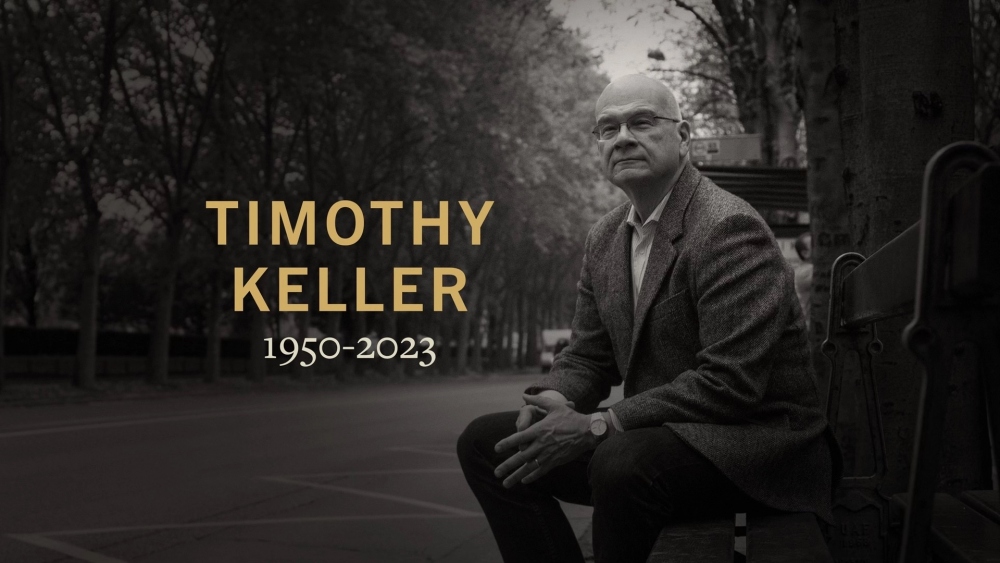Keller was a beloved and faithful Border-Stalker
We have never lived in New York City, and so never had the opportunity to have Rev Keller be our pastor. There is much I admired in him: his open and thoughtful embrace of historic orthodox Christianity; his love of the city and culture; his emphasis on the fact that there is no sacred/secular divide since Christ is Lord of all of life and reality; his lovely insistence that biblical faith was a Third Way that didn’t fit into the narrow division of left and right; the gentle humility he demonstrated to those who both agreed and disagreed with him; his knowledge of and keen ability to explain theological truths simply without dumbing them down; and his resolute hope in the gospel as not just the way to personal redemption but as holding the seed of cultural transformation. I saw him preach several times, lecture occasionally, and devoured his online messages and writing. Of all the lessons Keller taught me—and there are a lot—the most vital one came through his preaching.
Sermons are something I’m familiar with, so I have a solid basis for comparison. And Keller’s sermons stunned me. Repeatedly. Profoundly. And for this I am deeply grateful to God and to Rev. Keller. His preaching, to put it simply, was transformative for me.
I’ve attended church regularly since childhood. This means I have heard—with wildly varying degrees of interest—about 4,000+ sermons over the course of my lifetime. (Many more if you factor in the ones given at church camps, weeknight meetings, retreats, conferences, and seminars.) And always there’s been an expectation that I should invite non-Christian friends to attend with me. Almost never have I felt free to do so. A major reason is the sermon.
My problem was not of being afraid the truth would not be preached. I was usually confident it would be, at least in terms of what I understood to be the truth at the time. The problem is that I was also confident the truth would be preached in language in which my friends were not conversant, and in categories that were of interest only to those that had already bought into the tribe that is the church.
It’s a tribal problem. And that makes it difficult to address because the same sermon that is inaccessible to the outsider may bless the socks off the members of the tribe.
The dialect of my tribe is my natural language. That’s just a fact. The categories of belief, feeling, and practice of my tribe are how I naturally tend to think, sense, and live. But preaching in this tribal dialect using these tribal categories erects a wall for the outsider. Because they are members of another tribe, they naturally speak another dialect and comprehend reality in different categories. “It is hard to overstate,” Timothy Keller says, “how ghettoized our preaching is.” 1
The problem of cross-tribal communication is of course not unique to the church. It’s not a religious issue; it’s a fact of life in a pluralistic world. The problem becomes obvious when different languages are involved. If someone preaches in Xhosa in my Anglican church in Minnesota, no one will be surprised by the failure of communication. It’s more surprising when fellow English speakers fail to comprehend one another because they speak as members of differing tribes. Truth spoken in a common language may not be heard and understood as truth if tribal dialects and categories intervene.
We all are members of some tribe—usually multiple tribes—where tribal dialects and categories of thought that are so natural to those inside effectively keep outsiders outside. We become aware of the walls not by the ones our tribe erects but by the ones built by others. These make us outsiders and so are noticeable because they cause us discomfort. We’ve all been at parties where people are talking animatedly about stuff we cannot comprehend and about which we are distinctly uninterested. Comedy routines celebrate the confusion and misunderstanding that occur at such walls. We want our physician to drop his tribal dialect—no matter how useful it is for communicating with his fellow medical practitioners—and talk to us about our diagnosis in a way we can comprehend. We recognize instinctively it’s the speaker’s responsibility to bridge this vital gap.
For the church, this problem assumes added significance. Our gospel is not just for us but for all. Our preaching and witness should be understandable not just to church members but to our non-Christian neighbors as well. Sadly, as Christian faith has become increasingly unattractive in our world of advanced modernity, this communication gap has expanded into a looming chasm. My grandfather grew up in a small town not far from where I live. His neighbor would likely have understood a sermon about Jesus bearing the wrath of the Father on the cross, even if he rejected the call to believe. But my neighbor would likely be deeply offended by what she hears as an instance of divine child abuse and see my faith as containing dark and dangerous undercurrents of unjust relational cruelty.
And this brings me to what I see demonstrated so faithfully by Timothy Keller. He demonstrates how our preaching and witness must not merely be in words echoing within the walls of our tribe. He walked past the Church’s walls to visit, listen, befriend, love, serve, and learn in the spaces where members of different tribes mingle. In other words, he was a skilled, intentional mearcstapa—border-stalker.
I’m borrowing this term from Makoto Fujimura, who, borrowing an idea from Beowulf and Tolkien, likens artists to border-stalkers. “They cross tribal norms to see the whole, to navigate between the walls erected to protect the tribes,” he says. Fujimura believes artists adopt this role naturally because of the nature of their calling, and argues it is not only admirable but essential. “Border-stalkers have the ability to learn and communicate extratribal languages” and “are increasingly valued in cultures that are polarized.” 2 They “lower barriers to understanding and communication, and start to defuse the culture wars.” 3
Keller was a creative border-stalker. And this at a time when many preachers—indeed, many Christians—are busy reinforcing the walls of their tribe in a culture war in which they feel under assault by the majority society, by the tribes outside their walls. In his preaching and writing, Keller sought instead to imaginatively speak in terms that non-Christians can engage. He had listened to his non-Christian neighbors carefully enough to learn their language and identify how the yearnings of their hearts were unmet by the reductionistic secularism of their world. He set the gospel in this context in a way they could understand and appreciate. Christians listening to his preaching were thus shown week by week a model for bridging the gap so that those outside the church might apprehend the story of the gospel. In this he demonstrated the accessibility of the gospel in our witness to a watching world.
Margie and I became aware of Timothy Keller around the time Redeemer Presbyterian was launched in 1989. The scuttlebutt in the Presbyterian Church in America, in which we were members, was that Keller was a preacher worth hearing, and the growth of Redeemer in secular, hostile Manhattan was impressive. We had friends that began attending Redeemer and reported they would happily invite any non-Christian friend, no matter how skeptical or hostile to attend if Keller was preaching. He preached to a church full of Christians but spoke in terms that made sense to non-Christians, presenting a gospel of grace without watering it down. Rather than shy away from hard topics and texts, he addressed them, and did so in ways that made people think in fresh ways. His authenticity was easily apparent, and though his learning was impressive he was never elitist or pedantic.
The issue of the accessibility of the gospel was already an issue Margie and I were considering because two decades earlier a crisis of faith had been resolved under the influence of Edith and Francis Schaeffer. We saw the same dynamic at work in them. They listened carefully and commended the gospel of grace, tackling hard topics but always in ways that drew non-Christians into ongoing conversation rather than ending the discussion. Regardless of the biblical text under consideration, its themes were brought into creative tension with the thinking and practice of the wider culture. They believed that Jesus Christ is Lord of all, which meant that Christianity had something intelligent and substantial to say to every aspect of life, culture, and reality. The doctrines of the faith were understood as addressing the perennial questions of humankind, and they placed the story of Scripture in tension with our personal story. The Schaeffers mentioned movies not as illustrations of a point but as essential parts of an ongoing cultural conversation about things that matter. They took non-Christian thinkers seriously, appreciating their insights, while showing that their worldview was incomplete apart from Christ, just as Saint Paul did in Athens (Acts 17). The Schaeffers spoke in the vernacular, and as a result L’Abri attracted scores of people who would never darken the door of a church. Long before we were introduced to the terms, missional and border-stalking had become essential aspects of our sense of Christian faithfulness.
In an opinion piece in The New York Times (May 28, 2023), Tish Harrison Warren noted Keller’s understanding of and generosity of spirit towards those who did not share his faith.
In my early 20s, I attended an event where Tim Keller, an orthodox, evangelical Presbyterian pastor, was having a public debate with a secular humanist. In the nearly 20 years that have passed since the event, I still recall one moment distinctly. The secular humanist struggled with a point he was making and was unclear, something that happens often enough in public speaking. Keller could have chosen to go in for the kill rhetorically and make his opponent look foolish. Instead, he paused and asked, “Is this what you mean?” Keller then restated the secular argument in a clearer, better way, arguing against his own point of view. The other speaker agreed that was what he had meant, and Keller continued, countering the (now much stronger) point.
This generosity and understanding toward those with whom we disagree helped shape the way I now see the world. It had more of an impact on me, as a Christian, than any argument could. Keller refused the easier route of debate, insisting on finding the best argument of others, even if it meant strengthening his opponent’s case. He was in pursuit of truth and kindness, not point-scoring. That night I saw what Christian leaders should be like.
Keller has been intentional about speaking in the vernacular from the beginning of his ministry in New York. In “The Missional Church” (January 1, 2001), for example, he identified the need to “speak in the vernacular” as one of the nonnegotiable “practices of the missional church.”
In Christendom there is little difference between the language inside and outside of the church; technical biblical terms are well known inside and outside church life. Documents of the early U.S. Congress, for example, are riddled with allusions to and references from the Bible. In a missional church, however, these terms must be explained.
The missional church:
- avoids “tribal” language, stylized prayer language, unnecessarily pious evangelical jargon, and archaic language that seeks to set a spiritual tone.
- avoids “we-they” language, disdainful jokes that mock people of different politics and beliefs, and dismissive, disrespectful comments about those who differ with us.
- avoids sentimental, pompous, “inspirational” talk.
- avoids talking as if nonbelieving people were not present. If you speak and discourse as if your whole neighborhood were present (and not just scattered Christians), eventually more and more of your neighbors will find their way in or be invited.
Unless all of the above is the outflow of a truly humble-bold, gospel-changed heart, it is all just marketing and spin. 4
And in his article, “Evangelistic Worship,” Keller sharply critiques evangelical preaching.
It is hard to overstate how ghettoized our preaching is. It is common to make all kinds of statements that appear persuasive to us but are based upon all sorts of premises that the secular person does not hold; it is common to use terms and phrases that mean nothing outside of our Christian subgroup. So avoid unnecessary theological or evangelical subculture jargon, and explain carefully the basic theological concepts—confession of sin, praise, thanksgiving, and so on. In the preaching, show continual willingness to address the questions that the unbelieving heart will ask. Speak respectfully and sympathetically to people who have difficulty with Christianity. As you write the sermon, imagine a particular skeptical non-Christian in the chair listening to you. Add the necessary asides, the definitions, the extra explanations. Listen to everything said in the worship service with the ears of someone who has doubts or troubles with belief. 5
Timothy Keller demonstrated the importance of being a border-stalker and convinced me that not only should I follow his example, but that this is essential to Christian faithfulness. Not just for preachers but for every follower of Jesus. We should all seek to be mearcstapa.
And now he has gone Home. “Those who walk uprightly enter into peace,” the Hebrew prophet says, “they find rest as they lie in death.” And so, I grieve the loss of a beloved and respected mentor, the Rev. Dr. Timothy Keller, knowing that he now is with his Lord, and heaven is richer as a result.
Endnotes:
- Available online (June 22, 2021).
- Art + Faith: A Theology of Making by Makoto Fujimura (New Haven, CT: Yale University Press; 2020) p 15, 46.
- Culture Care: Reconnecting with Beauty for Our Common Life by Makoto Fujimura (Fujimura Institute; 2014, 2015) p. 39
- Available online (June 22, 2021).
- Available online (June 22, 2021).
Photo credit: From The Gospel Coalition online



